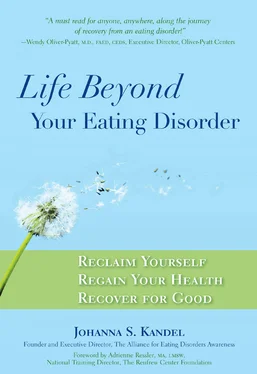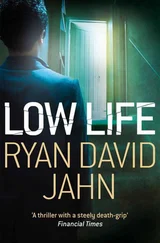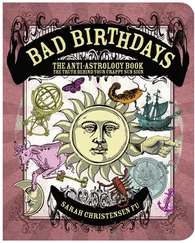Slowly, however, my journey to recovery was progressing and I was gradually getting healthier, which meant that I was also seeing things more clearly—at least some of the time. Part of that clarity involved coming to the realization that I wasn’t going to be able to counsel people with eating disorders in a one-on-one therapeutic environment while I was still recovering myself. That relationship would simply be too intense and triggering for me, and I didn’t think I’d be able to maintain the proper therapeutic distance. In my heart, I knew I wanted to speak publicly about eating disorders because, as I was struggling with my own recovery, I really didn’t have anywhere or anyone to go to for support. It was completely up to me to hold myself accountable and go to my treatment sessions. I had a wonderful family and wonderful friends, but none of them really knew how to provide the support I so desperately needed. How could they have known? I was living by myself in Orlando, I didn’t confide in them, and therefore they had no idea what I was really going through.
There were several times when I could have easily lost my battle with my eating disorder, but I hadn’t.
I didn’t want anyone else to have to walk that path alone. I didn’t want them to think that they couldn’t get better. I wanted to walk beside them when they were going through the same thing I had so that they would know they were not alone. During the entire time I was in treatment, I had never known a single person who got better. I was white-knuckling it the entire way, and I wanted to make it different for others. I loved the work I was doing at IAEDP, but I wanted to get out there and bring education and awareness to boys and girls who were the “me” I’d been in seventh grade. I wanted to tell them that I knew what they were thinking—that they thought they were in control, that they could just lose some weight and then stop. I’d walked through that door, so I knew that once it slammed shut behind them, they’d have no way to get out. Never once in my entire life had I awakened in the morning, looked out the window in sunny West Palm Beach and said, “Today I’m going to become an anorexic.” I wanted them to know that, and I wanted them to understand that if they walked through the same door I had, it might be the same for them.
During that first year of recovering, I remember talking to a friend on the telephone and laughing out loud. My friend started to cry and told me that she couldn’t remember the last time she’d actually heard me laugh.
Once I’d made the decision to focus on helping other people through education and advocacy, there was another phone call to my parents. I told them I’d decided not to go to graduate school, after all. Instead I was going to start my own nonprofit organization. I was starting to feel healthy; I knew I could do it, and I wanted to give back because I’d been given a second chance. There were several times when I could have easily lost my battle with my eating disorder, but I hadn’t. Now I couldn’t take my recovery for granted; I wanted to share what I’d seen and what I’d learned. I realize now that my parents had been assuming that as soon as I got better, I’d be going back to school. Needless to say, they were a bit shocked. My mother was supportive, but my father was very apprehensive. He really wanted me to follow the traditional educational route, the one he had always wanted and planned for me. In the end, however, they agreed to support me for a year—which at the age of twenty-one seemed like a lifetime to me.
I filed the incorporation papers for a nonprofit organization in October 2000, moved back home in December 2000 and in January 2001 opened the Alliance for Eating Disorders Awareness. I called all my friends, my family, all the people I knew from treatment and various therapists, and I asked them all to tell me: If they were the parent of a child with an eating disorder, or if they had a client with an eating disorder who needed support, what kind of organization and what kind of information would they want to have available to them?
Based on the information I received from friends, family and therapists, I decided that education was the place to start. I believed that sharing my story and promoting positive self-esteem were the way to go. To do that, I would go into schools, start talking to kids and tell them what I had found out during my struggles with my eating disorder. My first presentation was at a local private school in April 2001, and I was terrified. In my excitement about starting the organization, I’d forgotten that I’d failed speech class in college because I was afraid to speak in public. Put me on a stage to dance before an audience of thousands and I was fine, but public speaking was something else. Nevertheless, I prepared my talk, got up before a sea of high school students and shared my story. In the end, it was the best feeling I’d ever had in my entire life. I’d found my path and I knew it.
Now I can truly say I am recovered—recovery is definitely possible.
It’s now been nine years of an unbelievable journey. I remember the first time, during that first year of recovering, when I was talking to a friend on the telephone and laughing out loud. My friend started to cry and told me that she couldn’t remember the last time she’d actually heard me laugh. What an amazing day that was! I realized that, indeed, I could laugh again. And laughing feels really good!
If you’ve come this far with me, you’ve already gotten to the point where you are at least considering recovery. You’ve taken the first baby steps, and you’re probably scared. As much as we all want to get better, it’s frightening to give up something we know so well. When I was bingeing and restricting, I always knew exactly what to expect. I knew that if I did A, then B would happen. When I began my recovery, I had no idea what would happen, and for years I continued to tell people that I was recovering because I was still afraid to give up my eating disorder entirely. But now I can truly say I am recovered, and that recovery is definitely possible. Your path to health won’t be perfect or simple or straight any more than anyone else’s. In fact, it will be one of the hardest things you’ll ever have to do. But I can provide you with the tools I’ve acquired over many years to help you persevere through the highs and lows of recovery. Some of my tools will also become yours; others may not work for you. And you’ll probably be adding tools of your own. That’s the beauty of the recovery process: it is unique to each individual. There is no right or wrong way to recover.
Your path to health won’t be perfect or simple or straight. In fact, it will be one of the hardest things you’ll ever have to do. But I can help you persevere through the highs and lows.
There will surely be slipups, but it won’t always be so serious, either. We’re even going to have some good laughs along the way. And the one thing I can assure you is that recovery is more than worth it—it is without a doubt the best thing I’ve ever done for myself!
PROFILE IN RECOVERY: Allison’s Story
I first read Allison’s story in the newspaper the morning after she won the title of Miss Florida. I was immediately struck by how eloquently she spoke about her battle with bulimia: trying to live up to unrealistic standards, living life after her recovery and her passion for using her voice to create awareness and change. She used the platform her Miss Florida title provided to educate others and bring attention to how serious and widespread the problem of eating disorders really is. When her reign was over, she continued her outreach by creating her own nonprofit organization and traveling around the state speaking to students. I am deeply grateful that Allison has continued to use her voice throughout the years and that she now lives the life she imagined…eating-disorder free.
Читать дальше












